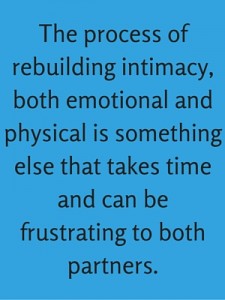
Many spouses find themselves in a frightening position after their husband or wife suffers a traumatic brain injury (TBI).
First, of course, is the question of life or death. But once they know their spouse will survive, they must then wait to find out how much of their former selves will be retained. Becoming a caregiver for a TBI survivor is a life-changing process. Putting together the pieces of the bond that once existed between husband and wife and creating a new fulfilling relationship can be very difficult and can take years. But there are ways to get help.
A Question of Survival
Rosemary Rawlins knows the difficulties of this process first hand. In 2002, her husband Hugh was hit by a car while riding his bicycle. He sustained a TBI and was given less than a one percent chance of survival. Doctors had to remove part of his skull to allow for his brain to swell.
Rosemary recalls the frightening time when he woke up from his coma, unable to speak and looking different from his former self:
This is one of the most difficult parts of having a loved one sustain a TBI. Rosemary remembers the feeling that her husband couldn’t connect with her on an emotional level. It was during this time that she felt a sense of loss for the husband she once knew.
Redefining Roles
Dr. Emilie Godwin, the Director of Psychotherapy and Family Services at Virginia Commonwealth University, has studied TBI and the effect it has on relationships. She says:
“The two people that are in the relationship after brain injury aren’t really the same two people that were in the relationship before [the] brain injury.”
Couples in this situation often must redefine their marital roles as the recovering partner goes through months of physical and occupational therapy.
To help families who are dealing with the aftereffects of a TBI, Dr. Godwin, along with her colleague Dr. Jeffrey Kreutzer, launched the Brain Injury Family Intervention (BIFI) program.
The Real Work of Recovery
Families of TBI survivors must learn to deal with the very significant emotional and behavioral differences that become apparent in their loved one after the injury. Dr. Kreutzer and his colleagues help families by teaching them coping strategies for living with their loved one, who either temporarily or permanently have sustained changes to their behavior and/or personality.
Immediately after an accident in which a person sustains a TBI, doctors and nurses do everything possible to heal the physical injuries and get the person back to a stable state. But for the TBI survivor, the real work begins once they leave the hospital.
 Getting back to a “normal” life is painstaking and can take months or years. Some people never return to normal. It is during this rehabilitation period that families find themselves with many questions about all manners of their new lives.
Getting back to a “normal” life is painstaking and can take months or years. Some people never return to normal. It is during this rehabilitation period that families find themselves with many questions about all manners of their new lives.
The BIFI program aims to help families at this point during the recovery of the TBI survivor. One of their primary goals is to give the family information. When families are told about common symptoms and challenges that can be expected in the months following a brain injury, it can make life much smoother in the wake of such a tragedy.
They also teach family members that a TBI affects each member of the family, and there are strategies that can be implemented to allow them to solve problems that arise in the home due to the TBI.
Strengthening Relationships in Response to Injury
Dr. Godwin specializes in working with couples after a TBI. She has designed the Therapeutic Couples Intervention (TCI) “to assist couples with positively adapting and coping with common losses and changes that result from a TBI.” The therapy aims to address the many components that make up a relationship and provide a “specified framework for assisting couples in strengthening the quality of their relationships in response to injury.”
The TCI is based on assumptions about what typically happens after a spouse suffers a TBI, such as the fact that the injury causes enormous changes in the relationship. Also, couples want to get their lives back to where they were before the accident. Managing the stress of caring for a spouse who has suffered such a terrible injury can be extremely difficult, especially if they are trying to do it themselves.
Along with her colleagues, Dr. Godwin implements the TCI in a five-session format. The sessions focus on giving the couples tactics and strategies for not only dealing with day-to-day life, but attempting to rebuild the relationship as much as possible. Couples are given psychological support as well as education via instruction and discussion.
Rehabbing Communication, Rebuilding Intimacy
After a brain injury, couples must often learn how to communicate with each other in a healthy manner.
There is an adjustment period before couples even know what problems they need to work on. Once they do, it is unrealistic to try to figure things out without the help of professionals who have the experience and education to make the process easier. The TCI helps couples set goals for the future and also teaches couples how to solve problems together that will arise during recovery.
The process of rebuilding intimacy, both emotional and physical is something else that takes time and can be frustrating to both partners. The TCI delves into this process and attempts to make it easier for couples.
[socialObu shorturl=”http://ow.ly/RtBhg” ]Keeping relationships strong after a traumatic brain injury. [/socialObu]
Beginning a New Life
The VCU Family Support Research website has a plethora of information relating to traumatic brain injuries. They have publications and articles that can be downloaded and studied to make sense of this serious type of injury. You can get information about their family intervention program as well as the couples intervention program and make connections with other people in similar situations to grow your support network.
Rosemary and Hugh Rawlins have both come a long way since Hugh’s bicycle accident. They have learned that the way they used to communicate no longer works. Dr. Kreutzer has shown them new strategies for communication.
He has also explained to them that their old life is over. Now it is time to work on the beginning of a new life.
Get the Help You Need
If you or a loved one have suffered a serious brain injury, the Brain Injury Law Center may be able to help you. We have a nationwide reputation for our work in the field of brain injury litigation. We offer free, no-obligation consultations. To speak with an attorney, call us today at (757) 244-7000 or contact us online.


